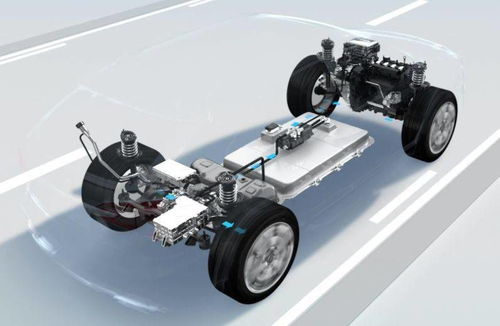肥东新能源车项目
Title: Developing Sustainable Practices in Feidong's New Energy Vehicle Recycling Industry
Introduction:
Feidong's burgeoning new energy vehicle (NEV) industry has brought about significant advancements in environmental sustainability and technological innovation. However, as the market matures, the issue of NEV recycling has gained prominence. This article delves into the challenges and opportunities in the Feidong region's NEV recycling sector, offering insights and recommendations for sustainable development.
Understanding Feidong's NEV Recycling Landscape:
Feidong, with its robust NEV industry, faces the challenge of managing the endoflife vehicles effectively. NEVs contain valuable materials like lithiumion batteries, motors, and electronic components, necessitating efficient recycling to minimize environmental impact and maximize resource recovery.
Challenges in NEV Recycling:
1.
Technological Complexity:
NEVs comprise intricate systems, requiring specialized processes for dismantling and recycling.2.
Safety Concerns:
Handling lithiumion batteries poses safety hazards if not managed properly.3.
Regulatory Compliance:
Compliance with environmental regulations and standards adds complexity to the recycling process.4.
Infrastructure Development:
Insufficient recycling infrastructure demands investments for scaling up operations.5.
Consumer Awareness:
Educating consumers about responsible disposal practices is crucial for increasing recycling rates.
Opportunities for Sustainable Development:
1.
Investment in Research and Development:
Encourage R&D initiatives for developing innovative recycling technologies tailored to NEVs.2.
PublicPrivate Partnerships:
Foster collaboration between government bodies, industry players, and research institutions to address recycling challenges collectively.3.
Standardization and Certification:
Establish industry standards and certifications to ensure uniformity and quality in recycling processes.4.
Incentive Mechanisms:
Implement incentives such as tax breaks or subsidies to incentivize NEV recycling and investment in recycling infrastructure.5.
Education and Awareness Campaigns:
Launch campaigns to educate consumers about the importance of recycling NEVs and the proper disposal of batteries.Recommendations for Stakeholders:
1.
Government:
Provide policy support, financial incentives, and regulatory frameworks to promote NEV recycling.2.
Industry Players:
Invest in R&D, collaborate with stakeholders, and adhere to recycling best practices.3.
Research Institutions:
Conduct research on NEV recycling technologies and provide expertise to industry partners.4.
Consumers:
Dispose of NEVs responsibly and participate in battery recycling programs.Conclusion:
Feidong's NEV recycling industry presents both challenges and opportunities for sustainable development. By addressing technological, regulatory, and awarenessrelated hurdles, stakeholders can pave the way for a circular economy where NEVs are recycled efficiently, conserving resources and minimizing environmental impact.
References:
[Insert relevant citations and sources here]
标签: 肥东汽车消费券 肥东新能源汽车快充站 合肥新能源汽车回收电话 肥东新能源车项目 新能源回收多少钱一辆
相关文章
-
露天煤业,能源开采的新篇章详细阅读

亲爱的读者,今天我们将一起探索一个既古老又现代的话题——露天煤业,煤炭,作为人类历史上最重要的能源之一,它的开采方式一直在不断进步,而露天煤业,正是这...
2025-10-02 391
-
上投内需基金,洞察中国消费升级趋势的投资利器详细阅读

在全球化的大背景下,中国作为世界第二大经济体,其内需市场的巨大潜力正逐渐成为全球投资者关注的焦点,随着中国经济结构的转型升级,消费已成为拉动经济增长的...
2025-10-01 306
-
东方财富证券网,数字化浪潮下的金融信息平台详细阅读

在数字化时代,信息的流通速度和获取方式已经发生了翻天覆地的变化,东方财富证券网作为中国领先的金融信息服务平台,正是这一变革的见证者和参与者,本文将深入...
2025-09-30 295
-
信达证券,中国资本市场的领航者详细阅读

在当今快速发展的金融市场中,信达证券作为中国资本市场的重要参与者,扮演着举足轻重的角色,本文将深入探讨信达证券的业务范围、市场地位、以及其在推动中国资...
2025-09-28 289
-
金龙汽车,中国商用车领域的领军者详细阅读

金龙汽车,作为中国商用车领域的领军企业,以其卓越的品质和创新技术在国内外市场上赢得了广泛的赞誉,本文将深入探讨金龙汽车的发展历程、产品线、技术创新以及...
2025-09-27 292
-
国投瑞银稳定增利,稳健投资的新选择详细阅读

在当前经济形势下,投资者对于稳健投资的需求日益增长,国投瑞银稳定增利作为一种低风险、稳健收益的投资产品,逐渐成为投资者关注的焦点,本文将深入探讨国投瑞...
2025-09-27 274
-
英镑实时汇率,掌握货币市场的脉搏详细阅读

在全球化的经济体系中,货币汇率的波动对个人投资者、企业以及国家经济都有着深远的影响,英镑作为世界上主要的储备货币之一,其汇率的实时变化对于从事国际贸易...
2025-09-27 257
-
美元指数的波动,影响因素、市场动态与新浪财经的角色详细阅读

在全球化的经济体系中,货币汇率的波动对国际贸易、投资和金融市场都有着深远的影响,美元指数(DXY)作为衡量美元相对于一篮子外币价值的指标,其变化不仅牵...
2025-09-27 165
